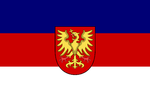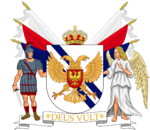Ashukov language
| Ashukov Ашуковски Евижња Ašukovski Jevižnja | |
|---|---|
 | |
| Regulated by | Ashukov Language Institute |
| Spoken in | Ashukov Federation |
| Influenced by | OCS, OES, Greek, Baltic |
| Type | Artlang |
The Ashukov Language (Ашуковски Евижња ashukovski yevizhnya [IPA: aʃukovski jeviʒɲa]) is a constructed language, built and primarily spoken in Ashukovo. It is characterized as an a posteriori language due to the fact that it has elements from Slavic languages, mostly from Old Church Slavonic and Old East Slavic. Other influences include Greek (both ancient and modern), and, occasionally, Baltic. It is currently regulated by the ALI, the Ashukov Language Institute, a subsidiary of the University of Ashukovo
Alphabet
The main alphabet of the Ashukov language is a modified version of the Cyrillic alphabet mostly based on the Russian one, with several letters taken from Serbian Cyrillic. Regionally, however, Ashukov uses its own version of the Greek alphabet as well, though the use of it is limited even in the Greek speaking regions of the country.
The Ashukov Cyrillic alphabet is the following:
|
|
Note: The Latin alphabet is never used for writing Ashukov.
Grammar
Declension
In Ashukov, the declension for both masculine and feminine, as well as neutral, is common.
| Singular | Plural | |||||
| Nominative | -ски1 | -и | -скийэ1 | |||
| Genitive | -а2/-ы3/-ии4 | -ска | -я/-ей3/-ий4 | -ския | ||
| Dative | -у | -ску | -ю | -скию | ||
| Locative | -(э)м | -скэм | -(э)ма | -скийэма | ||
1 The -ски ending refers to adjectives and in particular to those of or concerning a country, nationality et cetera.
- Example: Ашуковски Ashukov
2 Words ending in a or я, follow the rules of notes 3 and 4 respectively
3 For words ending in a
- Example: карты Genitive of the of the word "карта", meaning "card", картей Genitive of the plural карти of the word "карта".
4 For words ending in я
- Example: Фэдэрации Genitive of the of the word "Фэдэрация", meaning "Federation", Фэдэраций Genitive of the plural Фэдэрации of the word "карта".
Note: In words ending in a vowel, the vowel is replaced by the grammatical ending, according to the word's case.
Example
"авто" car
| Singular | Plural | |||
| Nominative | авто | авти | ||
| Genitive | авта | автя | ||
| Dative | авту | автю | ||
| Locative | автoм | автoма |
"Ашуковски" Ashukov
| Singular | Plural | |||
| Nominative | Ашуковски | Ашуковскийэ | ||
| Genitive | Ашуковска | Ашуковския | ||
| Dative | Ашуковску | Ашуковскию | ||
| Locative | Ашуковскэм | Ашуковскэма |
Verb conjucation
Note: The word моћи is the infinite form of the Ashukov verb which translates to "can".
| Aspect | Stem | Non-past | Past | Imperative | |
|---|---|---|---|---|---|
| Imperfective | моћ- | Present | Imperfect | [continuous] | |
| ('I do') | ('I was doing') | ('do!') | |||
| 1.Sg. | -ё | ша ю -ё | -ю | ||
| 2.Sg. | -(э)ш | ша ю -(э)ш | |||
| 3.Sg. | -(э)к | ша ю -(э)к | |||
| 1.Pl. | -(э)ми | ша ю -(э)ми | -я | ||
| 2.Pl. | -(э)тэ | ша ю -(э)тэ | |||
| 3.Pl. | -ёти | ша ю -ёти | |||
| Perfective | моћ- | Subjunctive | Aorist | [once] | |
| ('that I do') | ('I did') | ('do!') | |||
| 1.Sg. | ша -ё | ша -ю | |||
| 2.Sg. | ша -(э)ш | ||||
| 3.Sg. | ша -(э)к | ||||
| 1.Pl. | ша -(э)ми | ша -я | |||
| 2.Pl. | ша -(э)тэ | ||||
| 3.Pl. | ша -ёти | ||||
| Perfect | моћ- | Present Perf. | Past Perf. | ||
| ('I have done') | ('I had done') | ||||
| 1.Sg. | иметиё +infinitive | ша иметиё +infinitive | |||
| 2.Sg. | иметиш +infinitive | ша иметиш +infinitive | |||
| 3.Sg. | иметик +infinitive | ша иметик +infinitive | |||
| 1.Pl. | иметими +infinitive | ша иметими +infinitive | |||
| 2.Pl. | иметитэ +infinitive | ша иметитэ +infinitive | |||
| 3.Pl. | иметиёти +infinitive | ша иметиёти +infinitive |
| With future particle "кэ" | ||||
|---|---|---|---|---|
| Non-past | Past | |||
| Imperfective | кэ + Present | 'he will be doing' | кэ + Imperfect | 'he would do' |
| Perfective | кэ я + Present | 'he will do' | кэ + Aorist | 'he probably did' |
Romanski dialect
The Romanski dialect (Ashukov: Романски диалэкт; Romanski: Рѡманския Діалект; lit.: Dialect of the Romaeans) is a dialect of Ashukov used and spoken in Rhōmanía. The dialect on a large part resembles the grammar of the standard language, with the largest differences being in orthography. Romanski makes use of an alphabet differing heavily from standard Ashukov:
| Romanski Cyrillic Alphabet |
|---|
| Аа Бб Вв Гг Дд Ее Ѣѣ Жж Зз Ии Ѳѳ Іі Йй Кк Лл Мм Нн Оо Пп Рр Сс Тт Ћћ Ѵѵ Уу Фф Хх Ѡѡ Цц Чч Џџ Ьь Юю Яя |
Example and comparison
| Ashukov | Romanski Ashukov | Russian | Ashukov latin not in use |
Serbian | English |
|---|---|---|---|---|---|
| Унивэрсал дэкларация правя чэловэкя. | Икуменска декларація правя Человекя | Всеобщая декларация прав человека | Universal deklaracija pravja čelovekja. | Opšta deklaracija o pravima čovjeka | Universal Declaration of Human Rights |
| Члэн 1. Всэ чэловекские бући битёти роџэн свободни и еднаки в достоянствю и правию. Они битёти надэлэныйи са разум и сведоме и твеба дэятёти за едину до другу в духу братства. | Член 1. Все человескиѣ бучи битёти роџен свободни и ѣднаки в достоянствію и правиію. Они битёти наделенѵйи са разум и свѣдоме и твеба деятёти за ѣдину до другу в духу братства. | Статья 1. Все люди рождаются свободными и равными в своем достоинстве и правах. Они наделены разумом и совестью и должны поступать в отношении друг друга в духе братства. | Člen 1. Vse čelovjekskije bući bitjoti rodžen svobodni i jednaki v dostojanstvju i praviju. Oni bitjoti nadelenyji sa razum i svjedomje i tvjeba dejatjoti za jedinu do drugu v duhu bratstva. | Član 1. Sva ljudska bića rađaju se slobodna i jednaka u dostojanstvu i pravima. Ona su obdarena razumom i sviješću i treba da jedno prema drugome postupaju u duhu bratstva. | Article 1. All human beings are born free and equal in dignity and rights. They are endowed with reason and conscience and should act towards one another in a spirit of brotherhood. |
